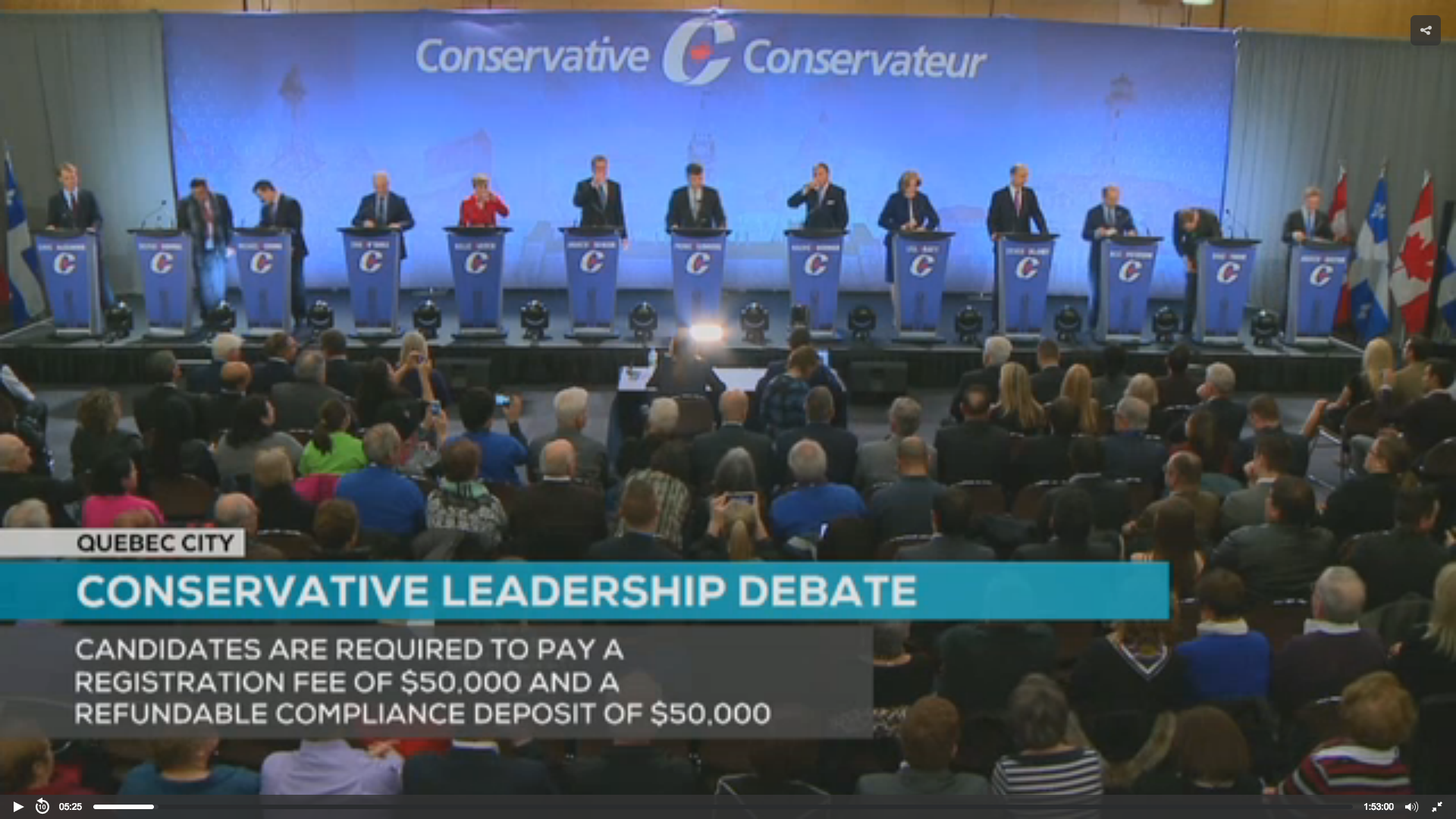The economy, the French language and terrorism were the winners of last night’s Conservative Party debate. Winners in that they got the most attention. The losers though, well, that would be anyone who tuned in hoping to hear something new from the Conservative Party status quo.
The Conservative leadership debate in Quebec City, the largest yet, was Stephen Blaney and Maxime Bernier’s night to shine, and they did, as the candidates who could pack the clearest and fastest punch.
Blaney’s riding just south of Quebec City in Lévis made it easy for his supporters to pack the room. Maxime Bernier’s support was nearly equal and the two unsurprisingly outperformed the other candidates.
But the debate format didn’t let them dominate, and to the delight of the crowd for more than 450, nearly all other candidates expressed themselves very well in French. With 13 candidates, there was a hard limit of 50 second interventions and moderator Pascale Déry did an excellent job moving the responses along.
There was very little diversity of opinion among the candidates. To kickstart the economy, we need to lower taxes. To boost the Conservative brand, we need to lower taxes. To stop terrorism we need to fund the RCAF, RCMP and other security and intelligence forces.
There was no mention at all of how the candidates planned to actually create jobs. Bernier decried subsidies to GM and Bombardier and continuously referenced dairy, egg, and poultry farmers as cartels who he will stop.
Michael Chong and Lisa Raitt argued that identity politics were partly to blame for the Conservative Party’s loss in 2015. They both encouraged the other candidates to abandon the divisive and xenophobic rhetoric from the election (my word, not theirs). Brad Trost was one of the candidates on the other side of that debate, and referenced the threat radical Islamic terrorism poses to him more than once.
The Indian Act made a brief appearance, with a broad consensus forming among the candidates that the solution to poverty, a lack of services and health care and education crises would not come from more money from the federal government.
Stephen Blaney said that he would eliminate reserves if he was elected. Chris Alexander argued that Canadians should do at least as much for Indigenous people as we do for Syrian refugees, a refrain that surfaces from time to time on right-wing Faebook groups. The common theme in the candidates’ replies to how to improve live for Indigenous people was to give them more freedom, particularly through property ownership.
The most awkward performance was from Kellie Leitch. With English media paying so much attention to Leitch, the stakes for her were high. Her French was clumsy and she relied too much on her face-to-face border agent interview plan.
Chris Alexander was a surprise winner. His French was clear and he remained measured and confident. If tonight represents the proof that Leitch can’t handle the race in French, it also represents proof that Alexander is a viable candidate.
The debate was divided into two themes: the economy and fiscal policy, and national defence and security. Consensus emerged on taxes and security spending. There was also consensus on the need for the next leader to be able to debate Justin Trudeau in both English and in French.
It was perhaps the only way that Kevin O’Leary was present, as none of O’Leary’s Twitter presence made it into candidates’ remarks. In the scrums that followed the debate, many candidates were asked about O’Leary’s absence tonight. O’Leary announced during the debate that he intends to enter the race.
The responses ranged from “he isn’t a threat” from Trost to Bernier welcoming more competition.
It was only during a scrum where candidates paid workers any attention. Lisa Raitt, the former cabinet minister who pre-emptively headed off a strike at Air Canada through interfering with collective bargaining, chided Kevin O’Leary for not having been present.
“He’s the guy who wants to jail union members…why didn’t he come here to tell them what he thinks?” she asked a scrum after the debate was over.
The next debate will be in Edmonton on Feb 28.
Like this article? Please chip in to keep stories like these coming.



